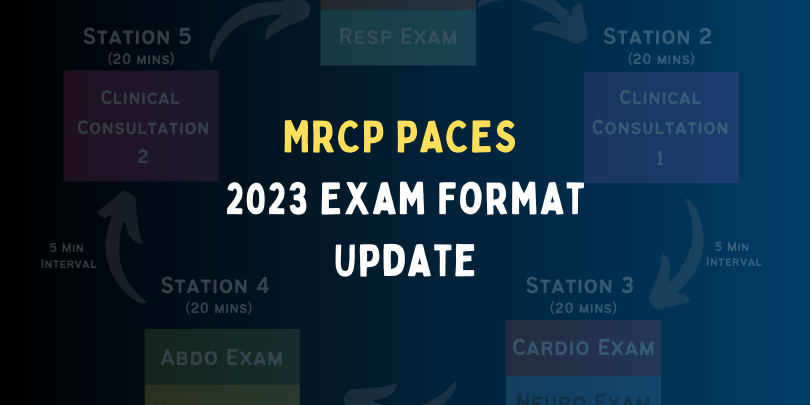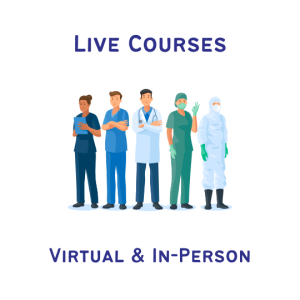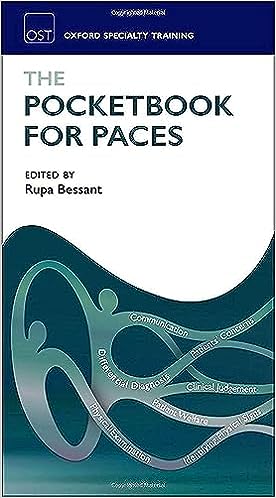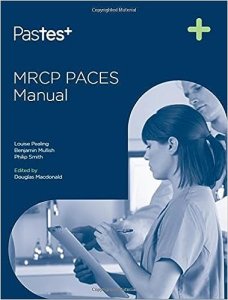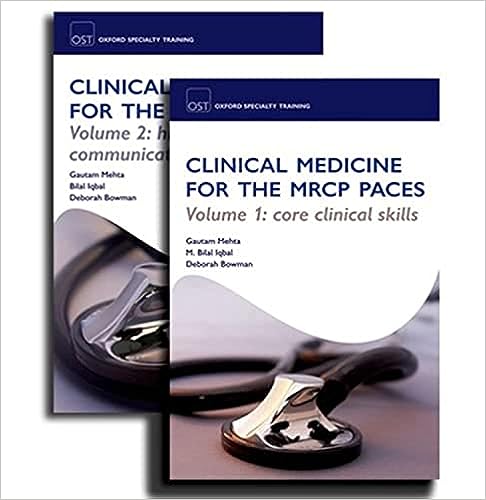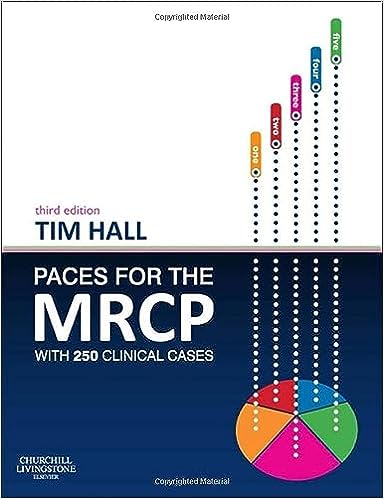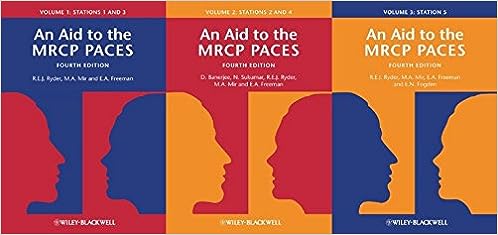
Published September 7, 2023 | Updated May 2, 2024
By David T. Otuonye
David is an IMT junior doctor with an interest in Endocrinology. He enjoys all things basketball, film and RnB music.
It hopefully should be obvious to all candidates preparing to sit the MRCP PACES exam that a crucial part of passing the exam is the careful selection and good use of preparatory resources.
Luckily, there are countless MRCP PACES resources available at your fingertips to maximise your chances of passing the exam. On the other hand, with so many resources out there, it may be daunting to correctly select the ones that suit you!
Fortunately, this article hopes to provide some insight and guidance in this area. In this article, I will review many of the available resources which candidates can use and their pros and cons.
Where possible, I will try to give my own recommendations based on my personal experiences, but I do recognize that everyone learns differently, so be sure to choose resources you feel are best suited for you!
Please note that many of these links are affiliate links, so we earn commission on sales. While the author has no conflicts of interest and thus wrote this without bias, MedCourse needs to pay the bills (and the authors!).
We would never edit the article to “sell” you on these products, but if you want to avoid the risk, simply Google the title and you’ll bypass our affiliate link.
PACES Courses
The MRCP PACES exam, as candidates should already be aware, is a different exam from the MRCP Part 1 and MRCP Part 2 exams they would have already passed. It is a practical exam, and thus practice on real patients with pathology is essential.
This is where PACES courses come in.
PACES courses provide an excellent opportunity to see and examine many patients with excellent clinical signs usually over a two to four-day span. There are many MRCP PACES courses available all around the UK that run multiple times a year and they are often oversubscribed. The structure and duration of each course may slightly differ so be sure to read the relevant information about your desired PACES course before signing up.
My Experience with a PACES Course
The MRCP PACES course I attended in September 2022 was PassPACES, a very popular (described as “almost legendary” in a 2012 BMJ article) course in London run by Rupa Bessant, a Consultant Rheumatologist, and the editor of one of the more popular PACES textbooks we will discuss later.
Although it was intense, I believe the course greatly raised my confidence and my chances of passing the exam, which I indeed passed on my first attempt.
Despite the great benefits of MRCP courses, they remain a commonly debated resource as to whether they are essential. This is understandably partly due to the large cost incurred with attending them.
Most four-day PACES courses now cost over £1000, with additional costs for travel and accommodation if not living locally.
Fortunately, many hospital trusts can cover most or even all of the cost of an MRCP PACES course as part of their study budget, so make sure you enquire about this! Better yet, local hospitals sometimes run their own PACES courses free of charge for their trainees. Do your research and check out the MRCP Course search page on MedCourse for all the available courses out there.
My opinion about MRCP PACES courses is this – although they do not guarantee a pass in the PACES exam, they do greatly increase your chances and your confidence in the exam room when taken a few weeks before your exam day.(following some months of adequate exam preparation of course!)
Online Revision Courses
Online MRCP PACES revision courses are becoming an increasingly more popular and affordable alternative to traditional in-person PACES courses. These usually consist of exemplary on-demand videos delivered by consultant physicians. Patients are examined according to exam standards and clinical signs, diagnosis and correct management are explained in the video.
These online courses are a fraction of the price of traditional courses and are always available and accessible (for the duration of the subscription paid for). The main downside of these courses is the lack of patient contact and ‘active’ learning as everything is online. Obviously, these courses cannot replace the tried-and-true revision method of practising on patients yourself across the wards and acute medical take.
Some online MRCP PACES courses include:
Pastest MRCP PACES Resource
I can personally attest to the benefit of this online resource. All 125 videos are of superior quality, physical signs are clear and there is a notes section to jot down your own notes under each video.
According to Pastest, the overall pass rate for the MRCP PACES 2022/3 exam was 49% but for users who used the Pastest Resource it was 75%.
Click via our affiliate link and use the code MEDCOURSE10 to get 10% off your subscription! (and help pay our bills)
Clinical Skills Pro
These professionally-filmed video courses are similar to Pastest in structure and pricing, but also include some nifty features like a virtual notebook and end-of-section practice questions you can use to practise with a colleague.
For an additional fee, you can receive an hour of live communication skills practice with one of their expert coaches.
Quesmed MRCP PACES Videos
Quesmed have stormed the medical school world with its finals question banks in recent years, and are growing with their audience into membership exams and interview qbanks.
They have created 100+ gold standard exam videos, alongside a PACES textbook and group study function. You can also use their app offline and track your progress.
Check out their PACES videos here, or use our promo code MEDCOURSE15 for 15% off your subscription.
Mock Exams
PACES Mock exams provide a good opportunity to test your readiness for the PACES exam by simulating the PACES carousel in exam-like conditions. They can reveal your weak areas and can increase your confidence for the real exam.
From personal experience, regarding where to find mock exams, they are not usually advertised as occurring on their own. Often PACES mock exams run as part of a PACES course, with the mock exam occurring on the final day of the course.
Paces Ahead, PACES4U, and Pass PACES are three popular PACES courses that run well-organized and helpful mock exams. With PACES4U, one can sign up for a mock exam only, without attending the course.
Mock exams are also often run by local hospitals and deaneries. Many deaneries organise up to three mock exams a year corresponding to each diet of the PACES exam. Be sure to liaise with your local deanery or hospital postgraduate education centre administrators for more information on this – they are often free for local trainees.
PACES Books
MRCP PACES books are a brilliant way to consolidate the knowledge gained from practising PACES cases with real patients. They are therefore not a replacement for continuous clinical examination practice, but a complement.
Most of the MRCP PACES books can be found wherever books are sold such as Amazon. One good tip is to find a used copy at a cheaper price such as on eBay or go to your local hospital library to borrow the books for free.
It is important to note that most of the more popular PACES books have yet to be specifically updated for the new PACES23 format. However, all these books contain key relevant exam information and can still be used in preparation for the new PACES23 format – most of the common cases and encounters these books cover will continue to show up in the PACES exam, regardless of the change in exam format.
The 10 Best PACES Books
There are countless PACES textbooks on the market, and I will now highlight the more widely used ones here, including the ones that I came across during my preparation.
Note that, while the author of this article has no affiliation to the books, and no competing interests to declare, the links included here are affiliate links to help MedCourse in producing and publishing more content.
The Pocketbook for PACES
by Rupa Bessant
As aforementioned, the editor of this book also runs the popular PassPACES London course. Some have claimed that this book and the course are all you need to pass the exam, although I disagree. The main positive of this book is that for its small size, it provides excellent coverage of the curriculum and required knowledge. It covers all the most common cases for each station and has many “Top Tips” to follow and “Common Pitfalls” to avoid, which I found very helpful.
The drawback I found with this book is that it can sometimes contain unnecessary information interspersed with the clinical gems present. Its ‘pocket’ size is both a gift and a curse, as the font size is very small and moreover, its pages very easily tear if you are not careful.
The MRCP PACES Handbook
by Saira Ghafur, Richard Kitchen, Parminder Judge, Samuel Blows
This was one of the books I used the most during my preparation. It benefits from being equally concise and adequately detailed, with helpful hints for each station.
The chapters I particularly loved are the Examiner Speaks chapter written by a long-term examiner of the PACES exam, and the Hawks and Doves Afterword, which really put my exam prep into a new perspective. I will say that the negatives (which are few) of the book are the lack of colour and pictures.
Pastest MRCP PACES Manual
by Doug Macdonald, Louise M. Pealing, Benjamin H. Mullish and Philip J. Smith
Pastest remains a household name in medical education, especially high high-stakes medical exams. The PACES manual has been discontinued, and replaced by their online products, so you can only find this textbook second-hand.
That being said, I think this book is more suited as a reference text due to its sheer size, detail and breadth of information pertaining to PACES. A very comprehensive book, with a large number of history-taking cases to practice with.
A potential improvement to the book would be a better laid out table of contents with accurate corresponding page numbers, and an index section – finding a specific topic in such a large book felt like finding a needle in a haystack.
Cases for PACES
by Stephen Hoole, Andrew Fry, Rachel Davies
Another popular favourite which I, as well as many colleagues, used. This book is best utilised in the final days to weeks leading up to the exam. It should be viewed as a quick reference guide, with all the relevant information arranged in concise bullet point form. For this book’s size, it still manages to adequately cover much of the curriculum for the exam.
I recommend that if using this book early on in your revision, you should ideally supplement it with a larger reference book. Overall, it provides a good balance between conciseness and thoroughness.
Clinical Medicine for the MRCP PACES
by Gautam Mehta, Bilal Iqbal, Deborah Bowman
Another popular and respected reference text that comes in two volumes. Volume 1 covers core clinical skills and volume 2 history taking, communication and ethics.
Very detailed and comprehensive, these two books answer virtually every question you could be asked in the viva portions of the PACES exam. If you don’t mind the occasional typo in the books, I would recommend getting your hands on both volumes from your local hospital library.
250 Cases in Clinical Medicine
by Eirini V Kasfiki, Ciaran WP Kelly
The 5th edition of this book has improved the format of old editions as well as added new chapters in addition to the great 250 clinical cases it boasts. These new chapters include emergency presentations and some core procedures relevant for the core medical curriculum. It has since been improved further in a 6th edition published June 2023, making it one of the most up-to-date resources available for PACES.
I used this book only once or twice as its layout did not suit me personally and it did not contain tips specifically for the PACES exam. However, the large number of cases, full colour clinical pictures and MCQs makes this book a suitable general medical reference book and a good addition to any medic’s personal library.
Pass PACES: Essential Study Guide
by Eirini V Kasfiki, Ciaran WP Kelly
I used this book sparingly but valued its true pocketbook size.
Great for on-the-go revision and can genuinely fit in your back pocket with ease (unlike the Pocketbook for PACES, where it may be a struggle).
The obvious downfall of this book is that it is arguably too concise and some finer details I think are important for the PACES exam have been omitted. Therefore, this book needs to be supplemented by a larger reference textbook.
This is one of the only books currently up-to-date for the 2023 format, which makes it extremely useful as a reference guide for the new style of clinical consultation stations.
While it only has 1 review at the time of updating (4 Oct 2023), the MasterPass MRCP series of books are well known and generally well-rated.
Two Weeks to PACES: Practical Assessment of Clinical Examination Skills
by Hasan Haboubi, Nafees Ali, Aseel Al-Ansari
This is a relatively new book, written for the 2020 update to PACES. The chapters are structured to reflect the new format which gives it a slight edge over most books in this list.
As the book title suggests, this book is like Cases for PACES book in that it is best used a few weeks running up to the exam as a quick reference guide. I used this book in my final two weeks of exam prep as a good refresher of what I had practiced for months. There are several summary lists and mnemonics for easy recall during the exam. There are some typographical errors occasionally within the book.
PACES for the MRCP: with 250 Clinical Cases
by Tim Hall
This book is probably the most comprehensive book in this list. There is very thorough coverage of all aspects of the exam, from correct clinical examination technique to many common cases for each station.
In keeping with its comprehensiveness, the book also has a gargantuan 100 tips for Passing PACES section at the end which is well worth the read. It is a book that is not only a great PACES reference, but another valuable medical textbook even after PACES is done and dusted.
An Aid to the MRCP PACES: Volume 1, 2, and 3
by Robert Ryder et al
This series of books is an old favourite of consultants and senior registrars alike, with good reason.
The books cover all stations and is unique in its structure in that the clinical cases for each station are ordered according to the frequency with which they come up in the PACES exam. This frequency is based on a survey done by junior doctors who have taken the exam. The book seems to be a passion project by the author as there are even sections on the emotions and experiences of candidates who have already taken the PACES exam.
It is an excellent reference series to go through after seeing patients on the wards. I found Volume 3 excellent for preparing for station 5. The only downside of these books is that purchasing all three volumes may be expensive – try to find it in your local hospital library first.
Podcasts
The use of podcasts for PACES revision is becoming more popular and I can personally attest to their effectiveness.
Podcasts provide a method of learning on the go or – for those who can multitask – learning while doing mundane tasks. Using podcasts, you can passively absorb important PACES information, allowing you to remain in revision mode even when you are not practising examining patients.
Here are some of the PACES podcasts I came across and used during my revision:
4 Top PACES Podcasts
The PrePACES Podcast by Dr Sam Williams
This is a free open-access podcast series hosted by Dr Sam Williams, a Cardiology Registrar. The podcast provides the necessary clinical knowledge, exam hacks and PACES tips from medical consultants (some of whom are actual examiners) and experienced junior doctors who have passed the exam.
The host manages to keep the episodes interesting throughout with minigames and challenges for his expert guests toward the end of each episode. I highly recommend listening in, especially during a long commute.
The PrePACES Podcast can be found on most of the major podcast/music apps such as Spotify and Apple Music.
MRCP Podcasts by Dr Podcast
This podcast series covers several common cases that are likely to show up in the PACES exam for each station. The podcasts are well structured, well-rehearsed, and are written by successful candidates and experienced consultant physicians. They contain exemplary model answers to many common questions asked by examiners.
The main drawback of these podcast series is the price tag attached to them. Podcasts for each station can be bought individually on their Dr Podcast website, or the entire MRCP bundle can be purchased and downloaded for £74.25.
PACES Revision Podcast by Medical Education Leeds
This free series of podcast episodes can be found on SoundCloud. Sixty episodes in total, each episode gives a good summary of clinical information needed to pass common PACES cases for each station.
It is a great option as it’s free and each episode is much shorter in duration than episodes in the other two podcasts listed above.
MEM Cast by Medicine East Midlands
This series of podcast episodes is hosted by various registrars in the East Midlands. Candidates can have a listen on Spotify for free.
It is aimed at IM Trainees and covers topics relevant to the curriculum for MRCP and IMT. However, some episodes are not always specific to PACES so I would not recommend listening solely for the purposes of passing the PACES exam, but rather for general improvement of knowledge and clinical skills as an IM Trainee.
PACES-Related Blogs
Blogs are a great way to get interesting personal experiences, tips and PACES exam hacks. A few blogs I found during my exam preparation are listed here:
The Best 4 PACES Blogs
Pastest Blog
Pastest has years of experience in providing medical revision material including online question banks and multimedia.
Their blog has many articles written by junior doctors who address all aspects of the PACES exam as well as other high-stakes exams like MRCP Part 1 and Part 2 Written.
Ploughing Through PACES
This website/blog created by Bethan Goulden has been used by many a junior doctor in their PACES preparation. It provides excellent overviews and tips for each station.
The different sections of the blog can be easily printed off (with credit to Bethan) to revise and practice with colleagues.
UKdoctoronFIRE
This blog is written by Dr Rory Chan, a Respiratory registrar in the UK. Here he documents his Financial Independence Retire Early (FIRE) financial journey but also writes many relevant posts on MRCP Part 1, Part 2 and PACES tips.
He even has blog posts on general career advice for physicians and being the medical registrar.
PACES Medical Education Leeds
In addition to their excellent podcast, the Medical Education team at Leeds has created a website with many useful links, as well as station-specific resources to help you in your revision for PACES.



